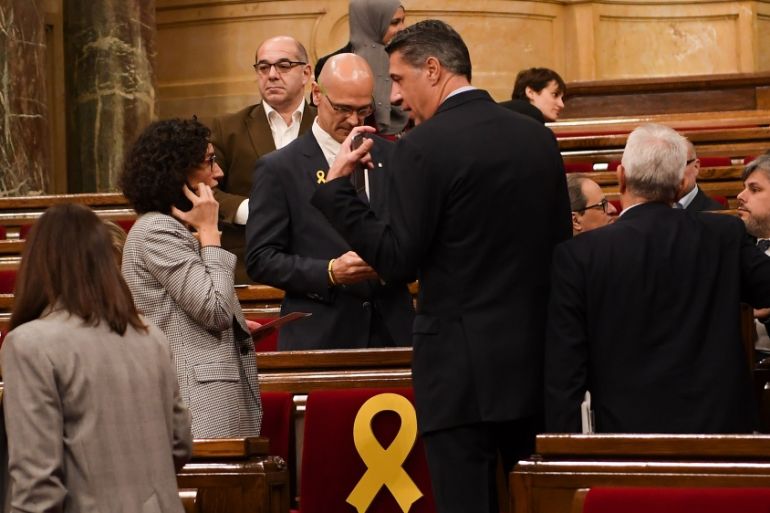Catalan separatists projected to win majority in regional polls
Opinion poll shows Esquerra Republicana de Catalunya party will gain 36-38 seats, while centre-right Junts per Catalunya to get 30-33 in the 135-seat assembly.

Separatist parties in Spain’s Catalonia region look set to jointly win a majority of seats in the regional parliament, according to an opinion poll published by TV3 as polls closed.
Held more than three years after a failed bid to break away from Spain, Sunday’s vote gauged the strength of the region’s pro-independence movement in an era dominated by the coronavirus crisis rather than separatist sentiment.
Keep reading
list of 2 itemsCould the far-right, pro-union Vox party win votes in Catalonia?
The opinion poll showed that the two main rival separatist parties – the left-wing Republican Left of Catalonia (Esquerra Republicana de Catalunya, ERC) and the centre-right Together for Catalonia (Junts per Catalunya) would get 36-38 and 30-33 seats, respectively, in the 135-seat assembly. Far-left separatist party Popular Unity Candidacy (CUP) would get seven seats.
In contrast, The Socialists’ Party, which opposes independence but favours dialogue, was seen getting more votes than any other party, but was behind ERC in terms of seats, with 34-36 regional legislators.
The far-right Vox was seen getting 6-7 lawmakers, getting seats in Catalonia’s regional parliament for the first time. It is already the third-largest party in Spain’s national parliament.
The survey was conducted by GAD3 through 8,000 phone calls throughout the campaign, with the number of calls intensifying as the campaign got closer to election day.
Even if official results confirm that the election is won by the separatist parties already in power in Catalonia, it is unlikely to lead to any repeat of the chaotic, short-lived declaration of independence in late 2017.
But it will still be an important signal of the separatists’ appeal and could affect the political trajectory of the pro-independence movement for years to come.
Official results are expected to trickle in through the evening, with no clear picture of the outcome before at least 21:00 GMT, and possibly later because of delays due to the pandemic.
Earlier in the day, election monitors swapped their face masks for full-body PPE, including suits, masks, visors, goggles and black bin bags tied around their feet during the final hour of voting – dubbed “the zombie hour” – a time slot reserved for people with confirmed or suspected COVID-19.
Other pandemic precautions during the day included temperatures taken on arrival, separate entrances and exits, hand gel on tap and floor markings to ensure social distancing.